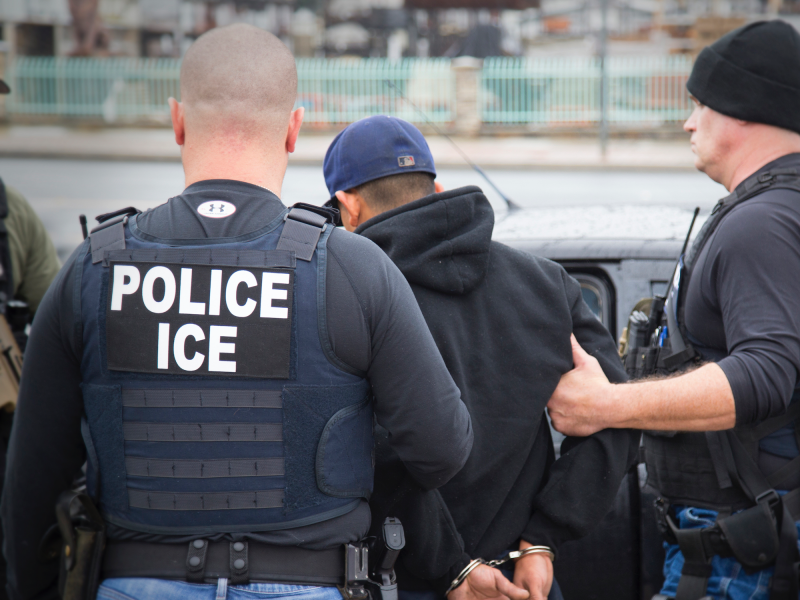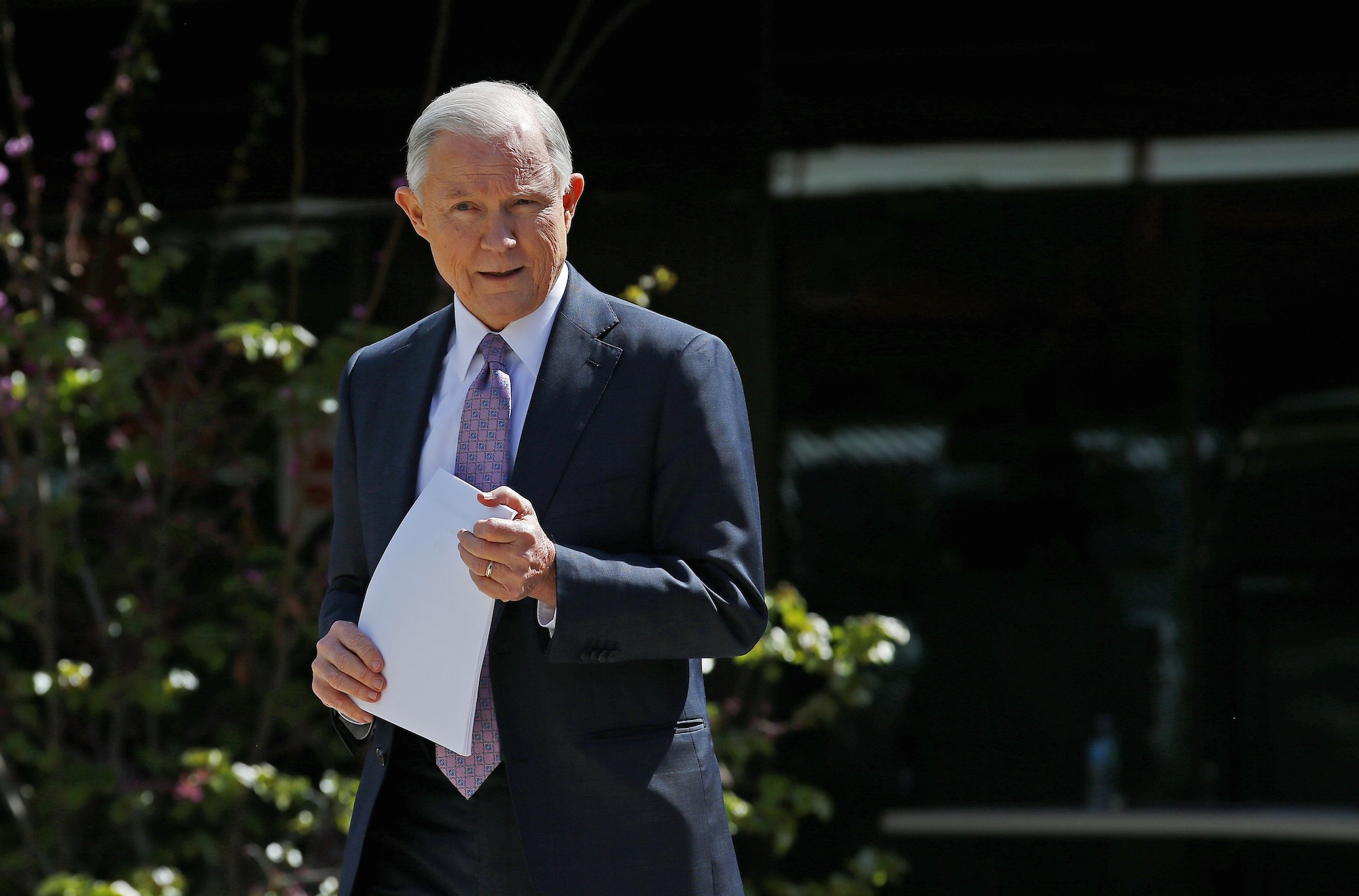Law enforcement leaders across the country are divided over how best to tackle the Trump administration’s demands that local authorities enforce federal immigration law.
Some sheriffs and police chiefs have bristled under the scrutiny, while others have grown emboldened by the heightened authority.
Attorney General Jeff Sessions appeared to deepen the rift earlier this week when he addressed the International Association of Chiefs of Police, reiterating his condemnations of so-called “sanctuary” jurisdictions that refuse to enforce federal immigration laws.
“Some mayors and city councils, and even a police chief and a sheriff here and there, are refusing to work with the federal government, choosing instead to protect the criminal aliens who harm public safety,” Sessions said. “For the sake of your communities, families, and children, work with us, so we can restore a lawful system of immigration and make our country a safer place.”
Although the term “sanctuary city” remains undefined, it is commonly used to refer to jurisdictions that limit their cooperation with federal immigration authorities, often through declining requests from the Immigration and Customs Enforcement agency to detain suspected undocumented immigrants.
Sessions raised eyebrows last month when he threatened to withhold federal grants from sanctuary jurisdictions. An executive order signed by President Donald Trump in January made similar threats, declaring it would withhold money from localities that violated federal immigration law.
The decision, and Sessions' continued strong rhetoric, has provoked a strong backlash among some cities and counties - a number of which have rushed to publicly defend themselves decisions in recent weeks.
California, in particular, has moved to turn the entire state into a "sanctuary." Earlier this week, the state senate passed a bill prohibiting police and sheriffs from using resources to arrest people for suspected immigration violations. It is expected to pass the state assembly, but it's unclear whether California's Democratic Governor Jerry Brown will sign it, according to The New York Times.
While the bill has been hailed by immigration advocates, police departments and sheriff's offices have had mixed reactions.
Charlie Beck, chief of the Los Angeles Police Department, has said he agrees with the bill's "underlying tenets" so long as they don't protect criminals, according to The Los Angeles Times. Yet the California State Sheriffs' Association is actively lobbying against the bill.
"All we are doing is providing information to the federal government so that they can do their job. To restrict that doesn't make sense," Kern County Sheriff Donny Youngblood told the New York Times.
'No one is above the law'

Some sheriffs feel so strongly about the issue that they've taken to publicity stunts and aggressive media interviews to condemn their law enforcement peers who disagree with the immigration crackdown.
Milwaukee County Sheriff David Clarke, one of President Donald Trump's staunchest supporters during his 2016 campaign, recently accused sanctuary cities of offering more protections to "illegal immigrants" than to American citizens.
"They're aiding and abetting criminality when they allow safe haven and safe harbor for people who are in the country illegally and have been arrested or convicted to some very serious crimes," he said last month on the Fox Business Network.
"The feds can withhold federal funding and I'm hoping that they do that because that's the carrot that we need to encourage people - when I say 'people,' law enforcement executives, elected officials, mayors, governors who want to be sanctuary cities."
Clarke isn't the only one speaking up. In Massachusetts last month, one sheriff even suggested that elected officials in sanctuary cities be jailed.
"Longstanding immigration law is crystal clear. It's a jail-able offense to harbor or conceal criminal illegal aliens from ICE," Bristol County Sheriff Thomas Hodgson said in his testimony to a congressional subcommittee on immigration.
"No one is above the law and the officials of these sanctuary cities who obstruct law enforcement should be held to the same legal standards and face the same punishment as would you or I."
Despite what Hodgson's statements, it is not illegal for local law enforcement agencies to refuse ICE requests to detain immigrants who have been arrested on non-immigration-related charges. Federal courts have ruled that detaining suspects past their scheduled release dates without judicial warrants can violate inmates' Fourth Amendment rights.
Yet that hasn't deterred Republican lawmakers from attempting to crack down on the uncooperative jurisdictions. In Texas, a bill could soon be passed through the state's Republican-controlled legislature that would permit criminal charges to be filed against elected officials that refuse to enforce federal immigration law.
The bill cleared a House committee this week and could soon hit the floor for a vote. Texas Governor Greg Abbott has expressed militant opposition to sanctuary policies, and has already withheld $1.5 million in grant money from Travis County after it recently implemented a policy to decline most ICE detainers.
 Foto: In this Tuesday, Feb. 7, 2017, photo released by U.S. Immigration and Customs Enforcement shows foreign nationals being arrested this week during a targeted enforcement operation conducted by U.S. Immigration and Customs Enforcement (ICE) aimed at immigration fugitives, re-entrants and at-large criminal aliens in Los Angeles. source Immigrations and Customs Enforcement handout via Associated Press
Foto: In this Tuesday, Feb. 7, 2017, photo released by U.S. Immigration and Customs Enforcement shows foreign nationals being arrested this week during a targeted enforcement operation conducted by U.S. Immigration and Customs Enforcement (ICE) aimed at immigration fugitives, re-entrants and at-large criminal aliens in Los Angeles. source Immigrations and Customs Enforcement handout via Associated Press
'Under what authority?'
But many other sheriffs and police chiefs have been reluctant to cooperate more fully with federal immigration agents and questioned the Trump administration on whether they are legally able to do so.
Homeland Security officials, including Secretary John Kelly, met in late March with representatives from local law enforcement agencies to discuss immigration enforcement. But the meeting grew tense when discussion turned to cooperation on federal requests to detain immigrants, according to ABC News.
When a senior Homeland Security official said it's legal for local police to detain suspected deportable immigrants until ICE agents arrive, the police officials attending responded, "Under what authority?" sources told ABC.
Law enforcement officials pressed the Trump administration at the meeting to provide a coherent explanation of the term "sanctuary city." Many of the attendees said they came away from the meeting with no more clarity on the issue.
"We think that as long as we're complying with federal law then we shouldn't be labeled with whatever label intimates that we're not," LAPD Chief Beck told the LA Times.
The debate over sanctuary policies is expected to come to a head in the coming weeks, as a federal judge rules on whether to grant a preliminary injunction blocking Trump's Jan. 25 executive order.
Lawyers for San Francisco and Santa Clara county argued in court on Friday the order is unconstitutional and could deprive the jurisdictions of billions of dollars in federal grant money, but a lawyer for the Trump administration said that the order was "narrow" in intent, and would not result in a significant funding cut.

